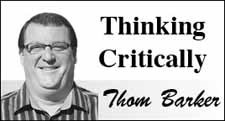A couple of weeks ago, I caught part of a story on CBC Radio as I was driving to work about Saskatchewan becoming the first province to pay for a therapy for depression called repetitive Transcranial Magnetic Stimulation (rTMS).
Now, as soon as I hear magnetic in relation to medicine my pseudoscience sense starts tingling. For millennia, magnetic healing has been popular. The idea that a rock (the original magnets were naturally-occurring lodestones) that exhibits unusual energetic properties, such as magnetism, might have medical applications appeals to both the scientific brain and the magical-thinking brain.
And, for just about as long as proponents have been selling magnetic cures, skeptics have been debunking them. Today, there are dozens of examples of products (essentially sexily-packaged household magnets) you can wear on your wrist, strap to your joints or put in your shoe or by your bedside that supposedly have healing effects, but simply do not do anything except liberate your hard-earned money from your bank account.
The story also mentioned that Health Canada (HC) approved the treatment all the way back in 2002. HC's stamp of approval, however, does nothing to quell my inner skeptic, because that organization routinely approves all manner of quackery based solely on safety with no regard for evidence-based efficacy.
Positioning Saskatchewan as the first province to pay for rTMS is intriguing as well. While being the first to adopt a cutting edge, safe and effective treatment may engender some kind of tribal pride, it can quickly turn into the shame of being the first to be duped.
Nevertheless, while this story inevitably raised a red flag for me, I never prejudge. I am also aware that there are plenty of legitimate diagnostic and therapeutic medical uses for electromagnetism, I had just not heard about this particular one.
As it turns out, there is growing evidence that rTMS, properly applied, has anti-depressant effects even, and perhaps especially, among patients who have been non-responsive to other treatments, such as medication. It is also potentially a safer, less invasive alternative to electroconvulsive therapy (formerly dubbed shock therapy), which has a notorious history and has fallen out of favour to a large degree, but is still in use.
I could not find an exact date when Saskatchewan first approved the therapy for payment, but it has been in the "Payment Schedule for Insured Services Provided by a Physician" for at least four years. I also couldn't find any other news about rTMS for depression in Saskatchewan except for the aforementioned CBC story and a similar one in the Regina Leader-Post Monday. Although approved for sometime, it appears it is only really getting off the ground here.
Dr. Dhanapal Natarajan, the Regina Qu'Appelle chief psychiatrist who is providing the service out of the Assiniboine Medical Clinic, has only treated six patients since he started in November 2013. He claims five of the six had a 50 to 75 per cent reduction of symptoms. That is not inconsistent with the broader research, although the sample size makes it statistically insignificant.
Still, a major study of 257 patients presented at the 2013 American Psychiatric Association Annual Meeting showed 68 per cent improved and 45 per cent were still in remission one year later.
While this appears to be an exciting and promising treatment for depression, I still have concerns about this story. There are all kinds of other indications-such as autism, sleep disorders, eating disorders, schizophrenia, Alzheimer's disease, Parkinson's disease, addictions and tinnitus-for which there is scant or no evidence as yet of rTMS's efficacy. Even so, there are plenty of clinics, particularly in the United States, but also in Canada, that are selling the treatment for all of these other indications.
There are no restrictions in the Saskatchewan payment schedule as to what physicians can use rTMS to treat except one clause in the "services not insured" section that reads "Procedures in the experimental/development phase." The ministry of health relies on practitioners to exercise ethical and professional judgement.
I am sure the vast majority of them do and will, but, call me cynical, we can only hope the regulatory system is robust enough to prevent those who don't or won't from setting up shop and taking advantage of people's desperation for profit.
Transcranial magnetic stimulation may yet prove effective for many things, but it is not a panacea. The moral of the story, is, as usual, buyer beware.




